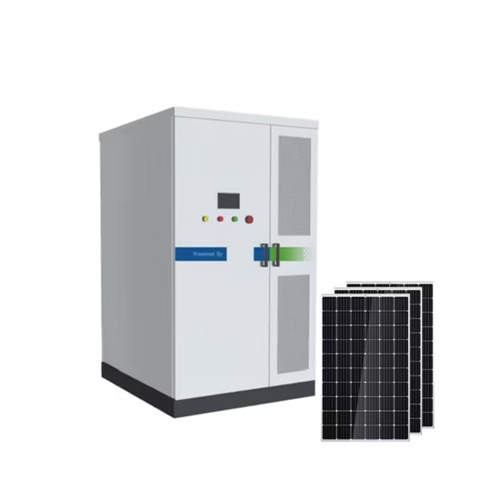New Energy Storage Battery Terminology

A Review on the Recent Advances in Battery Development and Energy
By installing battery energy storage system, renewable energy can be used more effectively because it is a backup power source, less reliant on the grid, has a smaller carbon footprint,

The Future of Energy Storage | MIT Energy Initiative
MITEI''s three-year Future of Energy Storage study explored the role that energy storage can play in fighting climate change and in the global adoption of clean energy grids. Replacing fossil fuel-based power generation with power

New Solid-State EV Battery Just Tip Of Energy
The new hybrid system is not the only example of an emerging fuel cell / battery convergence in the energy storage field. Another example is the use of green hydrogen fuel cells to power EV fast

DOE OE Global Energy Storage Database Energy Storage Terms Glossary
A battery energy storage system is a rechargeable battery and/or to reduce the need to buy new central station generation capacity and/or to ''rent'' generation capacity DOE OE Global

Battery Terminology Explained: Your Complete Guide
Energy Density. Energy density indicates the amount of energy a battery can store per unit of its volume or mass. We express it in watt-hours per liter (Wh/L) or kilogram (Wh/kg). Batteries with higher energy density offer

Glossary of Solar Terminology – EV Solar & Battery Storage Ltd
EV Solar & Battery Storage Ltd. EV Solar & Battery Storage is a family run business specialising in solar photo-voltaic system installation and repairs. Services include solar PV installations

Glossary of Battery Terms and Phrases: 242 Tech Terms
BESS stands for Battery Energy Storage System, a system used for storing energy through the use of batteries. Bluetooth. Bluetooth is a wireless technology used for short-range communication between electronic

How battery energy storage can power us to net zero
The use of battery energy storage in power systems is increasing. But while approximately 192GW of solar and 75GW of wind were installed globally in 2022, only 16GW/35GWh (gigawatt hours) of new storage

Battery Energy Storage Systems (BESS): The 2024 UK
By definition, a Battery Energy Storage Systems (BESS) is a type of energy storage solution, a collection of large batteries within a container, that can store and discharge electrical energy upon request. The system serves as a buffer

Global news, analysis and opinion on energy storage innovation
Subscribe to Newsletter Energy-Storage.news meets the Long Duration Energy Storage Council Editor Andy Colthorpe speaks with Long Duration Energy Storage Council director of markets

Overview of New Energy Storage Developments
It is expected that in 2025, the annual new installations of new energy storage globally and in China may exceed 60GW and 31GW respectively, and are expected to reach 67GW and 35GW. Chart: Forecast on global and

Battery Industry Basics: A Glossary for Battery Terms
A battery cell is the smallest energy-storing unit of a battery. A battery cell comes in various physical forms, from a small AA cell that you might find in a TV remote to large-format prismatic cells typically used in energy storage systems. Read

These 4 energy storage technologies are key to climate efforts
Europe and China are leading the installation of new pumped storage capacity – fuelled by the motion of water. Batteries are now being built at grid-scale in countries including

6 FAQs about [New Energy Storage Battery Terminology]
What is a battery energy storage system (BESS)?
Battery Energy Storage Systems (BESS) are pivotal technologies for sustainable and efficient energy solutions.
What is battery-based energy storage?
Battery-based energy storage is one of the most significant and effective methods for storing electrical energy. The optimum mix of efficiency, cost, and flexibility is provided by the electrochemical energy storage device, which has become indispensable to modern living.
What is the difference between fess and a battery energy storage system?
A storage system similar to FESS can function better than a battery energy storage system (BESS) in the event of a sudden shortage in the production of power from renewable sources, such as solar or wind sources . In the revolving mass of the FESS, electrical energy is stored.
What is an energy storage facility?
An energy storage facility typically consists of a storage medium, a power conversion system, and a system balance. Chemical, electrochemical, mechanical, electrical, and thermal storage technologies can be employed in renewable energy systems .
How does low temperature storage affect battery self-discharge?
Low temperature storage of batteries slows the pace of self-discharge and protects the battery’s initial energy. As a passivation layer forms on the electrodes over time, self-discharge is also believed to be reduced significantly.
How can battery storage help balancing supply changes?
The ever-increasing demand for electricity can be met while balancing supply changes with the use of robust energy storage devices. Battery storage can help with frequency stability and control for short-term needs, and they can help with energy management or reserves for long-term needs.
Related Contents
- New energy storage battery plastic frame foam
- Energy Storage New Energy Battery Application Scenarios
- New energy storage battery leading stocks
- What is a new energy storage battery cell
- New Energy Storage Battery Exhibition
- New energy battery energy storage box manufacturer
- Energy Storage New Energy Lithium Battery Store
- Is the battery a new energy source or energy storage
- New Energy Battery Energy Storage Equipment
- New Energy Storage Battery Outdoor Power Supply
- Types of battery energy storage systems New Zealand
- Three-blade energy storage battery and control system